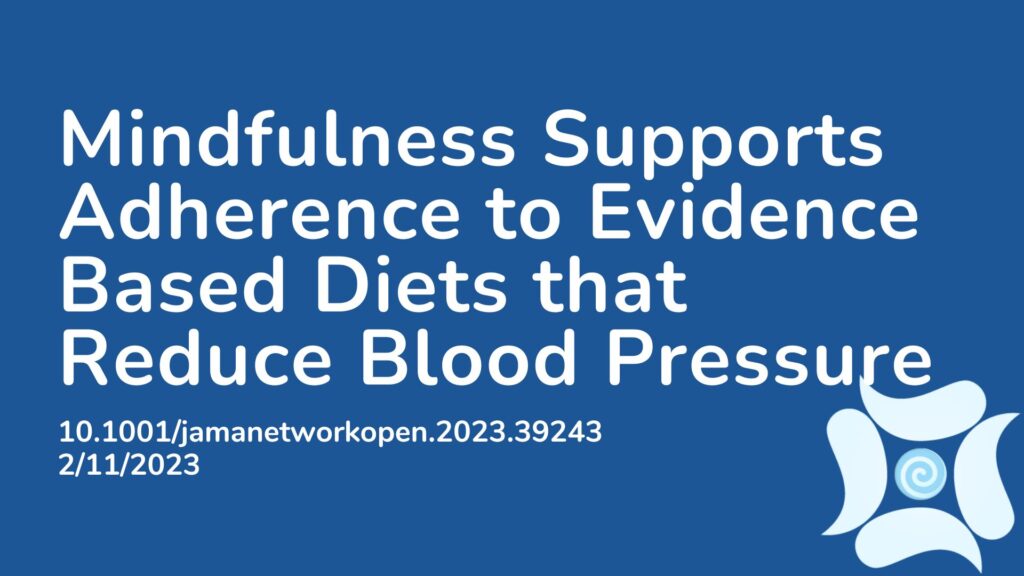Summary:
High blood pressure is the leading cause of cardiovascular disease and death worldwide. In the US, nearly half of adults have high blood pressure. Research indicates that adopting dietary patterns focused on vegetables, fruits, whole grains, lean proteins, nuts, and legumes while minimizing saturated fats, red/processed meats, sweets, added sugars, and sodium can lower blood pressure. The Dietary Approaches to Stop Hypertension (DASH) diet has proven highly effective as a dietary approach for high blood pressure, surpassing the Mediterranean diet and calorie restriction. There has recently been attention paid to the impact of mindfulness training on dietary patterns influencing high blood pressure such as the DASH diet. A program called Mindfulness-Based Blood Pressure Reduction (MB-BP) was designed to teach mindfulness practices targeting factors affecting blood pressure. However, no prior randomized clinical trials have examined the effects of MB-BP. This study looked at whether being mindful of physiological cues such as hunger, fullness, and how different foods affect one’s body, could reduce blood pressure. Out of the 201 participants, the MB-BP program led to a significant increase in adherence to the DASH diet. This suggests that the MB-BP program has the potential to support DASH dietary compliance in adults with elevated blood pressure and therefore reduce risk of cardiovascular disease and death.
Abstract:
Importance: Hypertension is a major cause of cardiovascular disease, and although the Dietary Approaches to Stop Hypertension (DASH) diet lowers blood pressure (BP), adherence is typically low. Mindfulness training adapted to improving health behaviors that lower BP could improve DASH adherence, in part through improved interoceptive awareness relevant to dietary consumption. Objective: To evaluate the effects of the Mindfulness-Based Blood Pressure Reduction (MB-BP) program on interoceptive awareness and DASH adherence. Design, Setting, and Participants: Parallel-group, phase 2, sequentially preregistered randomized clinical trials were conducted from June 1, 2017, to November 30, 2020. Follow-up was 6 months. Participants with elevated unattended office BP (≥120/80 mm Hg) were recruited from the population near Providence, Rhode Island. Of 348 participants assessed for eligibility, 67 did not meet inclusion criteria, 17 declined, and 63 did not enroll prior to study end date. In total, 201 participants were randomly assigned, 101 to the MB-BP program and 100 to the enhanced usual care control group, with 24 (11.9%) unavailable for follow-up. Outcome assessors and the data analyst were blinded to group allocation. Analyses were performed using intention-to-treat principles from June 1, 2022, to August 30, 2023. Interventions: The 8-week MB-BP program was adapted for elevated BP, including personalized feedback, education, and mindfulness training directed to hypertension risk factors. Both MB-BP and control groups received home BP monitoring devices with instructions and options for referral to primary care physicians. The control group also received educational brochures on controlling high BP. Main Outcomes and Measures: The primary outcome was Multidimensional Assessment of Interoceptive Awareness (MAIA) questionnaire scores (range 0-5, with higher scores indicating greater interoceptive awareness), and the secondary outcome was DASH adherence scores assessed via a 163-item Food Frequency Questionnaire (range 0-11, with higher scores indicating improved DASH adherence), all compared using regression analyses. Results: Among 201 participants, 118 (58.7%) were female, 163 (81.1%) were non-Hispanic White, and the mean (SD) age was 60.0 (12.2) years. The MB-BP program increased the MAIA score by 0.54 points (95% CI, 0.35-0.74 points; P < .001; Cohen d = 0.45) at 6 months vs control. In participants with poor baseline DASH adherence, the MB-BP program also significantly increased the DASH score by 0.62 points (95% CI, 0.13-1.11 points; P = .01; Cohen d = 0.71) at 6 months vs controls. The intervention was also associated with a 0.34-point improvement in the DASH diet score in all MB-BP participants from baseline (95% CI, 0.09-0.59 points; P = .01; Cohen d = 0.27), while the control group showed a −0.04 point change in DASH diet score from baseline to 6 months (95% CI, −0.31 to 0.24 points; P = .78; Cohen d = −0.03). Conclusions and Relevance: A mindfulness program adapted to improving health behaviors to lower BP improved interoceptive awareness and DASH adherence. The MB-BP program could support DASH dietary adherence in adults with elevated BP.
Article Publication Date: 2/11/2023
DOI: 10.1001/jamanetworkopen.2023.39243




